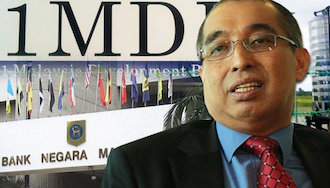Consultants paid to sabotage, says Malaysia Minister
According to Malaysia’s minister of Information and Communications, international media consultants are being paid to orchestrate negative sentiment globally on the country’s government and economy, in a ploy to weaken the economy through “economic sabotage”, thereby undermining the democratically elected government.
(Consultancy.uk) – In recent years the Malaysian currency has seen ups and downs. In the currency crises that affected many Asian countries in the 1997/1998 the Ringgit (the country’s currency) hit the lowest historical point against the dollar at RM4.73 to $1 dollar. At the time, president Mahathir Mohamad intervened and pegged the currency to the dollar at RM3.80, bringing some stability back to the market. In 2005 Malaysia, following China’s lead, unpegged its currency, allowing it to float semi-free and trend towards the value placed on it by the market – well below the RM3.80 mark.
In July this year however the currency for the first time broke through the RM3.80 barrier, and in recent months, starting on the 1st of August, the Ringgit rapidly depreciated against the dollar, and has since been pushed on through to the height of RM4.45.The reasons for the rapid depreciation of the currency remain relatively speculative. Different sources are circulating radically different explanations, even while the currency continues its downwards swing.
Political factors
One major cited cause of the rapid decline is controversy surrounding the 1Malaysia Development Bhd (1MDB) set up in 2009 during Prime Minister Najib Razak’s ascension to office. The fund was designed to turn Kuala Lumpur into a financial hub, and attracted a significant $11 billion in investment from banks and bondholders. In recent months the mega-fund failed to pay back its debts as planned.
As the fund appears to struggle to pay its debts, pundits have turned to questioning the funds’ construction. The former President Mohamad said that the fund lacks transparency and appears to be being used to fund a “lavish lifestyle” for Najib’s family. Investigative journalists from the Wall Street Journal recently added fuel to the debate, reporting that up to $700 million from the troubled fund has been funnelled into the personal bank accounts of Najib.
In response to the claims, the attorney general implemented a special task force that raided the offices of the 1MDB and took away some documents. The investigation was scuttled shortly after however, when Najib removed the attorney general on health grounds. International focus from Swiss prosecutors has too been directed at the 1MDB with suspected criminal activity including “corruption of public foreign officials, dishonest management of public interests and money laundering”. The FBI is also reported to be actively investigating the fund.
Earlier this year the Malaysian Public Accounts Committee (PAC) launched an investigation as to why 1MDB had dismissed its auditing firm KPMG back in 2012 and commissioned rival firm Deloitte instead to complete its 2013 financial year audit. To date, the PAC says it is still unsure on the motivation behind the switch of firms.
The result of the political crisis has been, claim some pundits, that trust in the Malaysian authorities has been undermined, with the resultant jittery activity of investors leading to large outflows of money leaving the economy.

Economic factors
Other factors affecting the currency include the continued strengthening of the US dollar. In combination with the expected increased interest rates in the US, many speculate that emerging currencies – such as the Brazilian Real or Malaysian Ringgit – could be hit even harder in the coming years. As US interest rates rise, investors are expected, according to Hak Bin Chua, an analyst at Merrill Lynch in Singapore, to unwind their investments further in Malaysian Government bonds. Further economic fundamentals affecting the slide have been attributed to the decrease in demand for Malaysian export crops, notably Palm Oil.
Political motivations
The Malaysian Government itself points towards the role of speculators, whose aim, according to Communications and Multimedia Minister, Datuk Seri Salleh Said Keruak, is to use economic forces to destabilise the democratically elected government. In his view, foreign “media consultants” are spinning stories to force a decrease in investor confidence, which would in turn create a vicious economic cycle, bringing the country to its knees – and the political apparatus out of power.
According to Salleh the 1MDB scandal is being used to further political ends. Calls from various parties about the on-going political crises are: “[…] not only mischievous but treasonous as well. Economic sabotage, especially one that is engineered and financed by Malaysians, is without a doubt an act of treason,” Salleh says. “To strengthen this allegation, there are even efforts to attack the Ringgit to ‘prove’ that the world has totally lost confidence in Malaysia.” He adds that these traitors must be exposed and appropriate action be taken against them.


